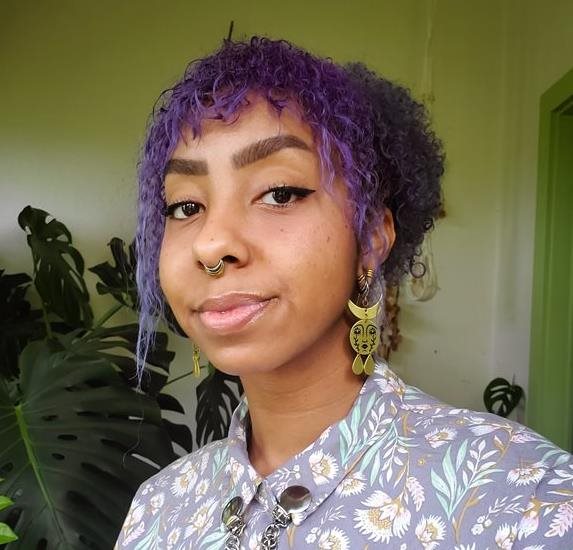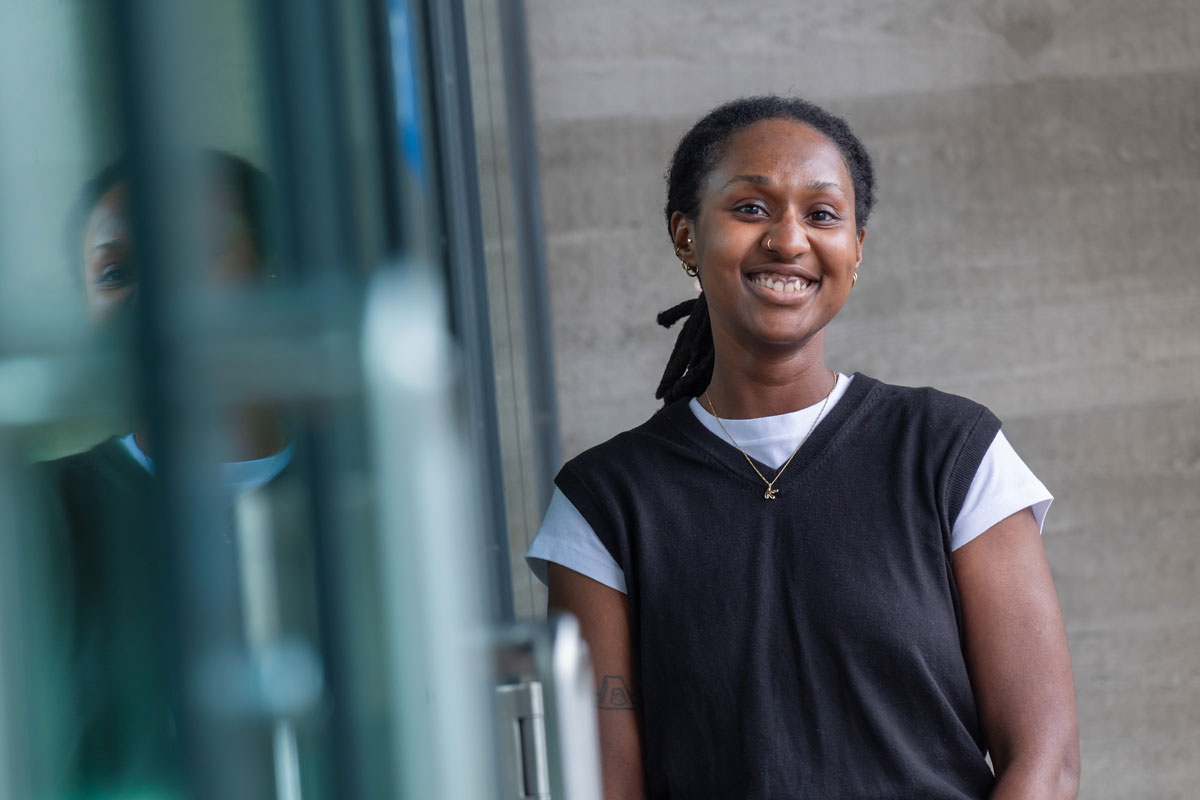
Growing up, Aaron Davis dealt with unstable housing and, at times, was without a home. “There were many periods of my life where my family’s housing stability crumbled, and we had to rely on the kindness of distant relatives to survive,” Davis said. “It was incredibly difficult and especially lonely as a child because I was discouraged from speaking about the ways in which my family’s needs weren’t getting met or how food insecurity was impacting me and my sister.
“These hardships helped drive a passion in me as an adult to focus on the needs and well-being of people most likely to get left out of supportive systems.”
Growing up, Davis also wanted to create a different kind of life and is well on the way to doing so, becoming the first in their family to earn a high school diploma, an associate degree and a bachelor’s degree.
After graduating from the University of Washington Bothell’s School of Nursing & Health Studies in 2021 with honors and getting accepted into every master’s program they applied to, Davis is now pursuing a degree in epidemiology because “it’s the one science that combines research with hard data and action that directly aligns with my goals.
“A lot of health research is learning, writing and publishing,” Davis explained, “but in epidemiology you actually get to fix what is broken.”
Fixing what’s broken
In recognition of their dedication to the most vulnerable communities, Davis has been named 2022’s Alumni of the Year. Established in 2019, the award recognizes individuals who have exemplified the core values of UW Bothell including transformational education, engaged scholarship and inclusive culture within the past year.
Even without the degree just yet, Davis has already done a lot of “fixing” — in the past year supporting and developing projects at UW Medicine’s Harm Reduction Research and Treatment Center and conducting advocacy-based research on the impacts of mass incarceration on individual and community health.
“If you are fortunate enough to work with Aaron, you quickly realize that they are a fearless change leader, scholar and organizer,” said Dr. Jody Early, professor in UW Bothell’s School of Nursing & Health Studies. “There is nothing passive or half-way about them.
“When I think about Aaron, the words of the great John Lewis come to mind: Aaron is someone who will ‘stand up, speak up and speak out’ when it comes to calling out injustice. Aaron is also the person who will help to fix or completely dismantle the system that’s causing the inequity or harm to exist in the first place.”
From receiving to giving
After being on the receiving end of community-outreach help years ago, Davis is now working at the HaRRT Center and is the one offering assistance to the unsheltered population as well as those suffering from substance abuse issues. The goal is to help them attain better health based on each individual’s circumstances and personal aspirations.
Taking a harm reduction approach, Davis believes that drug users should not have to get sober to reach their health goals. “Sometimes it is just about using more safely,” Davis said, “using with a buddy, using a little less or helping your body be ready for use by eating a meal and staying hydrated.”
Davis helps users with their mental health, too, developing weekly interventions for them that include art-based activities as well as reflections. “We are looking for ways to help people find peace, find themselves and unpack a lot of the traumas they carry,” Davis said. “We want to hold space for many modalities of healing.”
At the end of the year, Davis then created a zine that featured artwork and poetry the participants had created over the last 12 months. “At the zine release celebration one of the participants said, ‘It’s so important that people feel seen and valued, we miss being a part of community and having an outlet to tell our stories and share our art. People need spaces to heal with one another, and we have an outlet for that healing through the community zine.’
“Knowing that my contributions to the program made a significant impact on the participants means everything to me,” Davis said. “That’s what fills my cup.”
Incarceration impacts health
While Davis has a special connection with the unsheltered population, they care deeply for all marginalized and vulnerable communities. Working with Dr. Mienah Sharif, professor in the epidemiology department, Davis is looking into health disparities at U.S. incarceration and detention centers from a public health perspective.
“Our research shows that those who go into prisons and detention centers come out with more health problems than when they went in. It affects their mental and physical health,” Davis said. “People experiencing incarceration have very limited access to therapists, dentists or doctors so existing health problems can worsen and new health conditions arise.”
Davis pointed out that when incarcerated individuals leave the institutions, they face significant challenges to receiving health care and, without support or safety nets, struggle to afford basic needs such as food and shelter. “I don’t think people realize how far-reaching the health effects of incarceration are,” Davis said. “Even children of incarcerated or formerly incarcerated people can have worse health outcomes.”
Because having incarcerated parents induces stress, Davis said children with these family dynamics can be at a high risk of chronic disease and childhood toxic stress. “Having incarcerated parents is considered an adverse childhood experience that puts youth at greater risk for mental illness and violence, and becoming a victim of violence.”
Conducting this research feels like the most important thing Davis has ever done. “These papers Dr. Sharif and I are writing will be referenced one day. They will be sent to policy makers to change the prison system, and decisions could be informed by the work we are doing right now.”
Elevating voices
In conducting research on the prison system, Davis discovered there is little detailed information or health data regularly collected on incarcerated pregnant people. “This is extremely problematic because we aren’t getting data on who is having babies in jails, the outcome of their births, how many babies make it to term, how many survive in these settings. There is just a lot of dead space.”
To fill this gap in knowledge, Davis is writing a short commentary to submit for publication in a major public health journal. “It’s really about the need for data equity and data on minoritized people who are incarcerated and detained.”
Looking to the future, Davis plans to get a doctorate in either social welfare or public health. “I will use my degree to continue working with historically marginalized communities that struggle to obtain funding, get their initiatives pushed through in local government or even have their voices heard,” Davis said.
“My goal is to elevate the hell out of their voices and find any and all platforms available to tell their stories and share their needs. I won’t consider my work done until those needs are met.”
Early noted that to say Davis is inspiring is an understatement. “Aaron continues to help lead change locally, directing mutual aid efforts in their community as well as food justice initiatives,” she said. “They have gone above and beyond to help those who need it most, and they have done it all while parenting and caring for family.
“I am continually amazed and inspired by them. This recognition is after only one year after graduating from UW Bothell. Imagine what Aaron will accomplish in their lifetime.”



